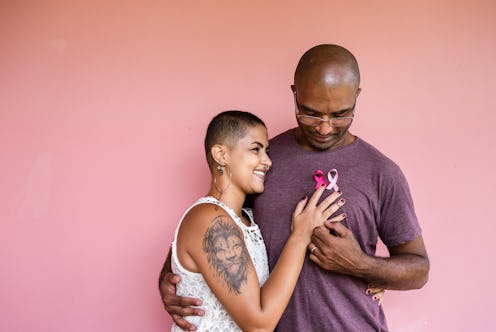Life
Breast Cancer Affects Plenty Of Men, Too — But Here’s Why They’re Not Talking About It

Each October for as long as I can remember, National Breast Cancer Month meant rampant pink capitalism, heartfelt stories of survival and loss, calls for donations, and omnipresent awareness campaigns. From the yogurt I ate, to the fundraisers at school in which I participated, breast cancer awareness was all around me. I thought I knew all there was to know about the disease. Despite the hyper visibility of breast cancer, male breast cancer is rarely included in awareness campaigns and testimonials.
Yes, women are disproportionately affected by breast cancer: One in eight women in the U.S. will develop invasive breast cancer in her lifetime. Men, however, run the risk of developing this deadly cancer, too. Women have been taught by family, peers, doctors, and even popular culture to be on the lookout for breast cancer symptoms, while typically, breasts aren’t the first body part associated with the male anatomy. Although men have less breast tissue, it’s still there. Because less than 0.1 percent of men (1 in 1,000) are diagnosed with breast cancer, men aren’t taught to take precautions and identify symptoms of breast cancer. This October, consider how you can talk to the men in your life about breast cancer. It may be a lifesaving conversation.
Age and genetic mutations are the two major risk factors for women and men who develop breast cancer. Men who have a history of breast cancer in their family and are between 60 and 70 years old are more likely to be diagnosed. Similarly, breast cancer rates among women tend to increase after 40 and are highest among women in their 70s. Men and women who are eventually diagnosed with breast cancer also have similar symptoms. Most male breast cancer diagnoses come after a man finds a lump in his breast. Unfortunately, some men wait to go to the doctor after noticing more serious symptoms, such as bleeding from the nipple, which is an indication that the cancer has spread. Delaying medical attention can make the cancer harder to treat.
A study from the Cleveland Clinic shows that only three in five men go the doctor for their annual check up, and just over 40 percent go to the doctor when they fear they have a serious medical condition. But if men don’t know the symptoms of breast cancer or aren’t even aware that they can get breast cancer, the chances of them seeking medical attention for their breast tissue is slim. This study also gave merit to a widely accepted stereotype — men go to the doctor to appease their partners or family members. 19 percent of the men surveyed admitted they will go the doctor so their significant other or loved one will stop nagging them. Treatment for male breast cancer is the same treatment doctors use for women. Women can encourage their male partners, friends, or family members to accompany them during their annual mammograms. Having someone there who has gone through it before can be comforting, and make the situation less scary for the men in your life.
It’s important to note that having a conversation about breast cancer with the men in your life may be difficult. While men are likely to engage in casual conversation about current events (36 percent), sports (32 percent), and their job (32 percent), only 7 percent are likely to chat about their health. Toxic masculinity plays a large role in men’s reluctance to talk about health issues. Men's concept of when is the appropriate time to seek help is driven by cultural norms that perpetuate the idea that strong men don’t need to worry about frivolous matters such as health and safety (spoiler alert: they do). So a conversation about breast cancer — a cancer that is perceived as a woman’s issue — with a man who is already hesitant to talk about his health can be challenging.
Remember to be patient, and remind the men in your life that staying up to date on their health history is beneficial to them and their family members because breast cancer mutations can be passed down from both sides of the family. Use the remaining days in Breast Cancer Awareness Month spread knowledge to the men in your life.
This article was originally published on